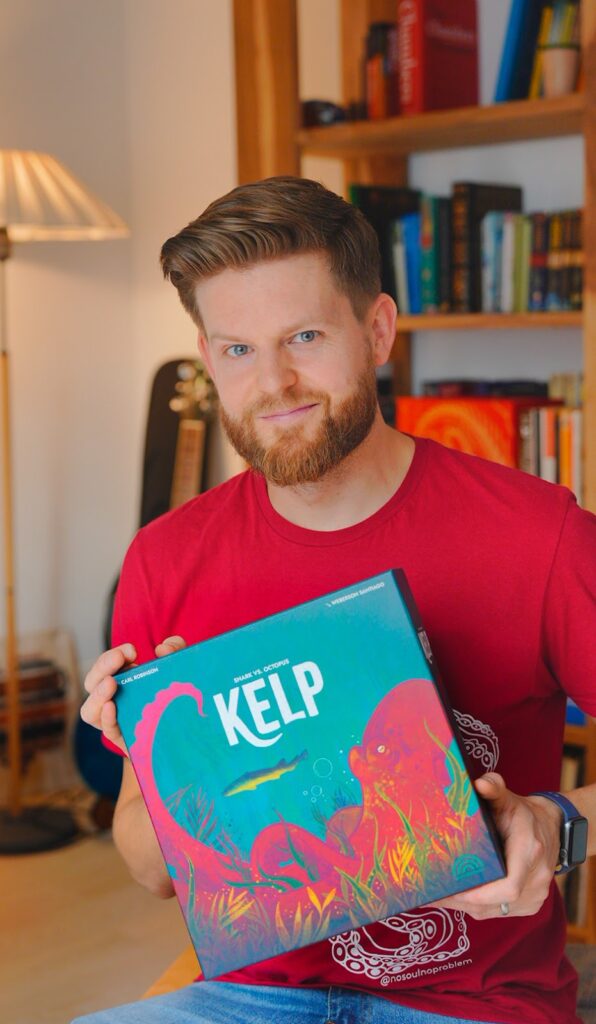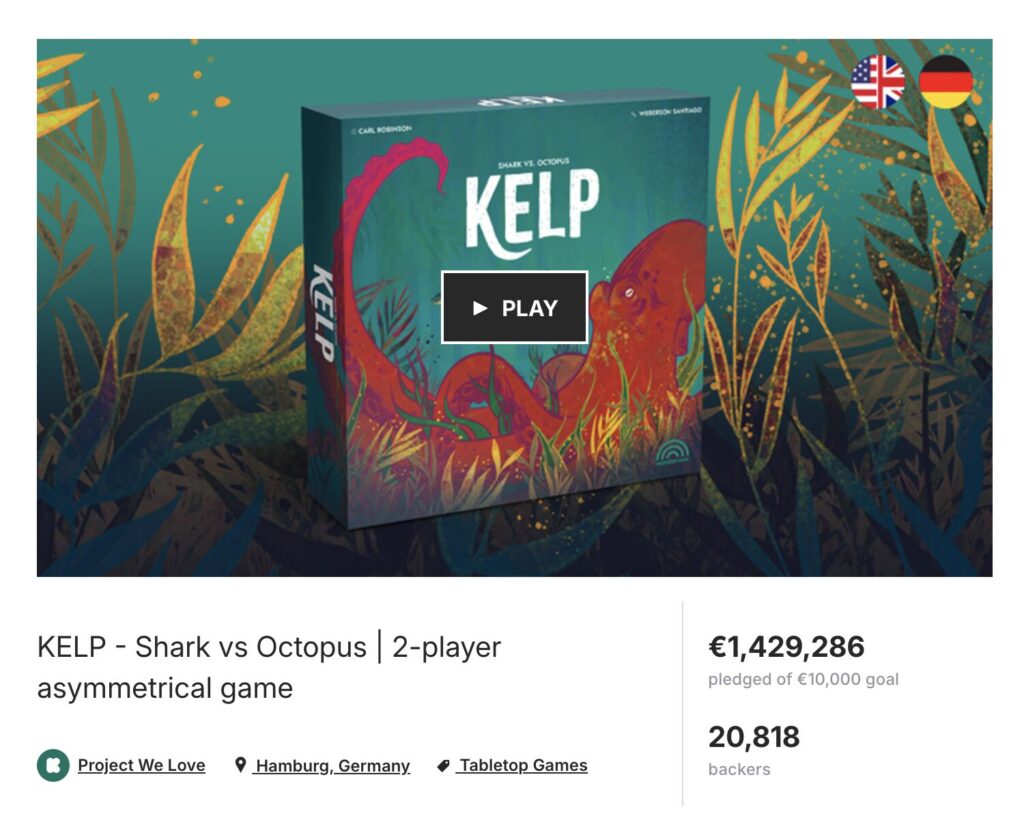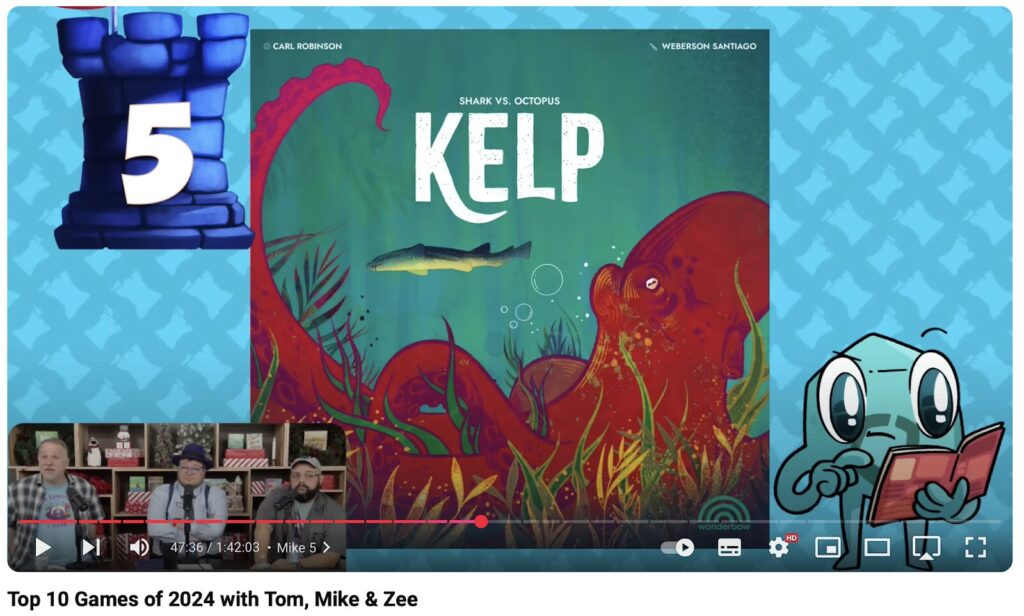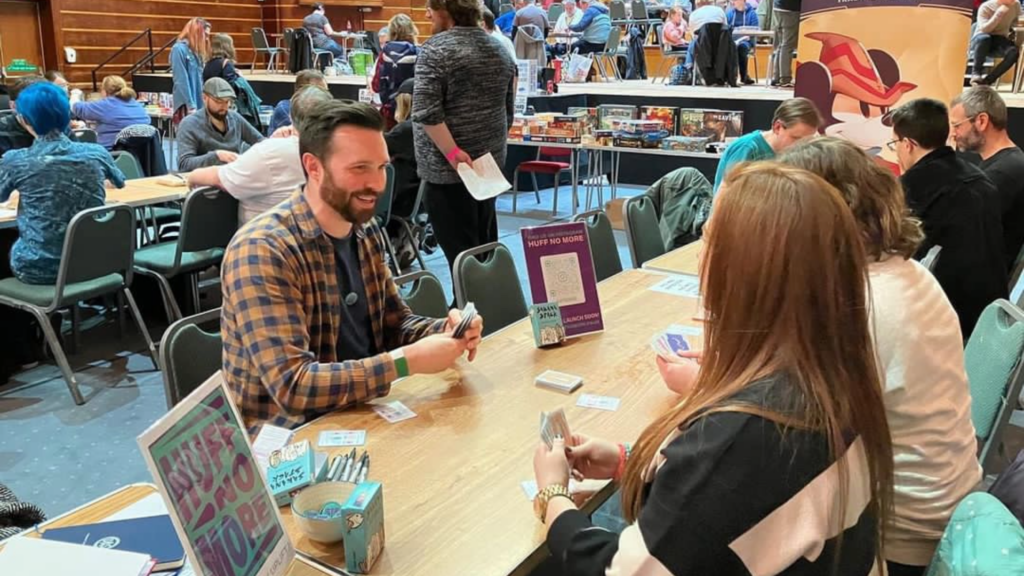Let’s start 2025 off with a cracking conversation with Carl Robinson, designer of the game Kelp. Carl can be found hanging around on instagram if you want to reach out and say hi! Enjoy the post, I can promise it’s a great read. I can also promise there’s some wonderful posts in the works so please consider subscribing to the blog using the popup, or the box at the bottom of the conversation.
Joe: Welcome back to the What If blog! Can you start with a short introduction, who are you and what brings you to the world of board game design?
Carl: Who am I? I used to joke that I was a superhero trained in the deadly, martial art of Origami. My superhero name was A4. The silent crane. The leaping frog. Papercut? You’ll lose your flipping arm, mate. But in more seriousness, I’m Carl, a full-time drama teacher and part-time board-game designer, originally from the Northwest of England but I have been living in Belgium for over a decade now. I don’t know much about Origami. I can crochet, but that’s not quite as suitable for a punchline.

What brings me to the world of board game design? In 2012, when I got into hobby board games, I almost immediately wanted to try designing them. I tinkered around with various ideas over the following 10 years, until I was struck with the idea for my first published board game- Kelp. For the past four years, that has been my focus and my passion, and I’m really pleased with how it’s been received since release. Nowadays, I’m fortunate to say that many of the goals I started out with as a designer have been met, so I’m here because I love the creative act of designing games. I’m a big believer that there is a lot of happiness to be gained in life from striving for mastery in something. For a while, a few years back, I tried to write a novel but found that even though I had a half-decent idea for a book, I just wasn’t passionate about learning about writing. When it comes to design though, I have a thirst for knowledge about the craft, I’ll read/listen to/watch pretty much anything I can get my hands on, and I find it thrilling to do the iterative design work necessary to make games.
I’m a big believer that there is a lot of happiness to be gained in life from striving for mastery in something.
Joe: That’s a great intro, thank you Carl. We’ve talked previously about tension in games (in fact you were the first conversation on the blog) and you’ve contributed to a brilliant post about perspectives on publishing routes.
Today I’d like to explore what the last year has been like for you. From an outsider’s perspective it looks to have been a wild and wonderful ride, the reception to Kelp has been incredible.
I wonder if we could briefly start at the beginning of last year to set the scene?
Carl: This time last year, the Kelp Kickstarter had wrapped up and the team at Wonderbow (the publisher of Kelp) and I were doing the final editing and proofing, preparing for the game to be manufactured. It was all going smoothly except that Wonderbow were in the midst of a shocking counterfeit debacle, in which Kelp had been counterfeit months before it should have been available to the public. So, yeah. There was that.

Joe: that’s an epic, although not ideal start to your first published game. I know you’ve written about it before. But with a year behind you do you look at the experience differently, and was there anything you did at the time that you wouldn’t again (or vice versa)?
Carl: I can’t speak for Wonderbow, but no, I don’t think I’d do anything differently except the obvious thing now of not putting cards/components with full/final art on Tabletop Simulator. The publisher did everything by the book, they were just unlucky to be the target of it. I know it took a lot of their time and energy to deal with it, and although most of it has died down, there’s still counterfeits being sold on Temu and the likes. And I think it’s highly likely to happen to other publishers in the future, unless the online marketplaces start to take action, and consumers get wise to the scams. It’s really unfortunate but I hope it drives people to buy from reputable sellers and do their research before jumping on a too-good-to-be-true deal.
Joe: a valuable lesson for all of us – I’ve been guilty of putting the good stuff onto TTS, it feels good for the game to feel polished but I won’t be doing that anymore!
Once the game started to hit the doorsteps of backers, that must have been quite an incredible feeling. What was that like, seeing the game played in the wild for the first time?
Carl: Yeah, it was so exciting. European English copies were some of the last to be distributed, just because of the way the boats/customs played out. So I didn’t actually get my copies until a few weeks after distribution started. The anticipation kept me on tenterhooks for the whole time, but seeing videos and photos of people unboxing it, getting excited when it showed up at their door, posting early thoughts about the game, was so satisfying. One guy was so excited to open his package he put on Wolverine claws, sharp ones, and filmed himself ripping into the shipping box. Turned out, it wasn’t Kelp inside but seeing his excitement to get his hands on the game made me smile.
One guy was so excited to open his package he put on Wolverine claws, sharp ones, and filmed himself ripping into the shipping box.
Joe: You can see how much excitement there has been for Kelp, wolverine claws are extreme, but I’ve seen so many posts with people just buzzing about your game. Did you expect this response, or have some sort of feeling that people were going to love the game (beyond knowing it had done well during the Kickstarter campaign)?
Carl: When I began making Kelp, I set out, as many designers do, to make the perfect game for me. In those early playtests, the only response to the game I cared about was my own, as back then I didn’t really have any intentions of trying to get the game published. But as the game system stabilised, and I started to expand the group of people I was testing it with, I began getting some surprisingly positive feedback.

Early on I was fortunate to be able to playtest with Carl van Ostrand (Merchants Cove, Bardwood Grove, KAPOW!) and he gave me some very positive feedback and encouragement. This and other feedback I was receiving from a range of designers and players gave me the confidence to develop the game further and dive into the steps necessary to get the game published. So, although I had no idea of the level of success that Kelp was capable of, I did have a sense that I had a game worthy of being published and that I was proud of.
Joe: for anyone interested in the full design history of Kelp, you can read Carl’s designer diary on board game geek.
Your answer reminds me of how supportive so much of the board games design world is. Everyone is keen for a world with more games in it, and you can see that in the support that is so readily available if you go looking for it.
I saw this morning that you got ranked in the top #10 games of 2024 by the Dice Tower, and Wonderbow for their production on Kelp ranked #1 for game productions of 2024. This goes a little beyond just a game that is worthy of being published. How do you find this level of recognition, especially with this being your first game?

Carl: I’m overjoyed, honestly. The Dice Tower have said some great things about the game, and after being a fan of the channel since 2012, it’s still amazing to me to see something I made on there.
I never set out to make board game design my career, I love what I do as a teacher, so I don’t feel any pressure because of this, for my future projects. I’m just happy to keep working on them for the love of doing it, and anything that comes out of it that seems worth publishing then I’ll take it as it comes.
Joe: That’s a brilliant, and healthy perspective to take. Aside from the warnings over copyright and design theft, I wonder what you think you’ve learned this year. And what you might say to other new indie designers that are working on their first time projects.
Carl: I get the sense that established designers often pitch their games in a much less developed state than I did with Kelp. I suspect that they often get their games to a functional and somewhat balanced state and then start pitching, and if a publisher likes the game they will do some in-house development work with/without the designer. In my case, Kelp was in a functional and more or less balanced state pretty soon after I started working on it, maybe a year after at most. But I didn’t start pitching it for another year after that and continued to develop it the whole time in between, and even subsequently after it was signed. And I think as a designer pitching my game for the first time, this level of development which I had already put in helped the game stand out from the other pitches that Wonderbow was receiving at the time.
I would say I’ve learned a lot about the differences between designing a game (or conceptualising a game) and developing it.
In recent years, I would say I’ve learned a lot about the differences between designing a game (or conceptualising a game) and developing it. As a first time designer, it’s probably a good idea to do as much development on your idea as you can. That means thinking about balance, streamlining, UI, rule writing, integrated theming, etc. If nothing else, having a good understanding of these concepts, and showing that you are willing to put work in to make your game into a marketable product, shows a prospective publisher that you can be a good person to work with.
Joe: That’s really insightful, and also quite helpful to me. I’m thinking of exploring the publisher route rather than Kickstarting at the moment; it’s good to know that the fully polished article isn’t what is needed.
Can I ask what’s coming up next for you? Do you have anything in the works that you can tease for us?
Carl: Right now I’m mostly working on a possible Kelp expansion, and we’ve just started to invite Kelp fans to playtest the current version, through the Wonderbow Discord server. If anyone reading this is familiar with Kelp, has access to Tabletop Simulator, and is willing to help me playtest they can join the Wonderbow Discord (https://discord.gg/3NZWpcrsfX) and say “Playtester here” in the #introductions channel and they can join in with the fun. As a tease, if you’ve seen the documentary My Octopus Teacher, which inspired me to make Kelp, you’ll know what happens at the end… a mother making the ultimate sacrifice. That’s what I’m working on…
Told you it was ace.
Here’s you to do list:
- Follow Carl on Instagram.
- Subscribe to the blog.


